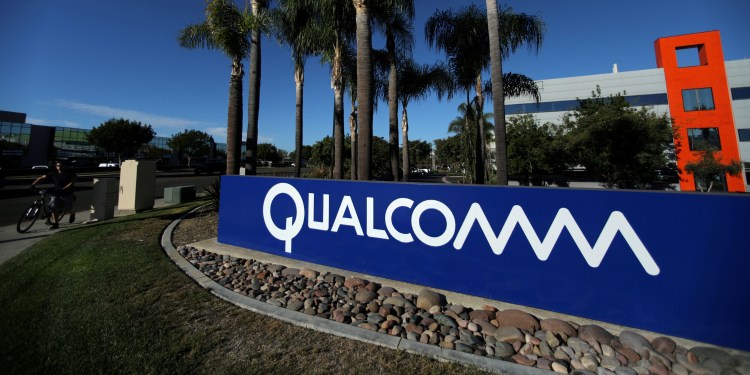Chipmaker Qualcomm is signaling that it’s ready for a truce in its ongoing patent licensing dispute with Apple, as CEO Steve Mollenkopf hit CNBC’s airwaves today to predict that the companies will resolve their issues by the end of 2018. His comments come shortly after Qualcomm announced that it’s slashing its patent licensing fees, and therefore its profit forecasts, in apparent response to an Apple lawsuit and international regulatory actions.
While Mollenkopf noted that the Qualcomm-Apple case is still making its way through the courts, he suggested that “legal milestones” coming this summer are putting pressure on both companies to settle. “There will be a decision one way or the other,” he said, “either through the courts, or in the way that I think everybody would prefer, in a settlement, here and before the end of the year if we’re lucky.”
CNBC asked whether Apple CEO Tim Cook’s upcoming June deposition in the lawsuit provided a particular incentive for near-term settlement. “I think in all cases, people don’t like to have legal risks hanging over their heads,” Mollenkopf said, “and as you get closer to the legal milestones, the perspective of both companies — including Qualcomm — is such that I think the environment gets better to get a settlement.” He mentioned that the companies continue to actively communicate, and that Apple’s response has been “very consistent with our view and optimism that we’ll be able to get this done and delivered in fiscal year ’19. There’s just too much, too many reasons to get this settled.”
Mollenkopf interestingly pronounced the word “many” like “money,” hinting at the $1 billion dollar financial basis of the dispute. While Qualcomm’s patent licensing terms have caught the attention of U.S. and foreign governments, the core issue is over the amount of fees paid by licensees, specifically whether or not its licensing rates are “excessive.”
June 5th: The AI Audit in NYC
Join us next week in NYC to engage with top executive leaders, delving into strategies for auditing AI models to ensure fairness, optimal performance, and ethical compliance across diverse organizations. Secure your attendance for this exclusive invite-only event.
Previously, each phone maker paid Qualcomm a percentage of each phone’s selling price, enabling Qualcomm to collect significantly more on a $500 phone than a $200 phone, even if both phones used the same Qualcomm components. Apple complained that its payments to Qualcomm rose with its phone prices, even though new premium features were coming from non-Qualcomm innovations. Under the newly announced licensing strategy, Qualcomm will cap each phone’s basis price at $400, enabling cheap phones to pay a lower rate without penalizing premium phone makers. Major licensee Samsung has apparently already received a rate cut, reducing Qualcomm’s licensing forecasts by several hundred million dollars.
“We are really working on technology that’s important,” Mollenkopf said, acknowledging recent U.S. government actions to protect the company from a takeover by foreign-owned rival Broadcom. “On the other side, we also say, this is very valuable technology, and we need to make sure we can deliver that value to our shareholders. And that’s what the debate is about, whenever we have discussions with a licensee.”
Even in the current LTE generation, Apple has not been able to fully stop using Qualcomm modems in its iPhones. Fast Company reported yesterday that Apple has modified its plan to cut Qualcomm wholly out of its upcoming 2018 iPhones, and now expects to use at least 30 percent Qualcomm modems — perhaps more if production-challenged rival Intel fails to deliver all of the modems Apple needs. Qualcomm is similarly believed to have a major lead over Intel in the engineering and production of 5G modems, which will be necessary for next-generation iPhones starting in 2019 or 2020.

